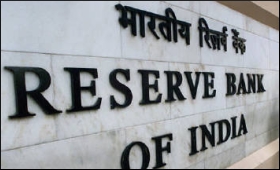|
|
|

|
Make customers' rights charter enforceable, says RBI panel
|
|

|
|
| Top Stories |
 |
|
|
|
IANS | 05 Jun, 2023
A panel set up by the RBI to examine and review the state of customer
service in regulated entities (REs), has suggested that the central bank
should consider making the charter of customer rights enforceable after
reviewing and updating it.
The central bank may consider extending the charter to on Banking Financial Companies (NBFCs) also, it has suggested.
The
RBI had formed the seven member committee under the chairmanship of
former RBI Deputy Governor B.P. Kanungo on May 23, 2022 to evaluate the
efficacy, adequacy and quality of customer service in entities regulated
by the RBI vis-a-vis the existing RBI guidelines on customer service
and identify gaps, if any.
The committee has, in its report submitted to the RBI recently, has suggested the above mentioned measures.
"With
a view to ensure that there is uniformity in classifying, recording and
reporting of complaints by the REs, the Reserve Bank should lay down a
definition of a complaint under the internal grievance redress mechanism
which should also capture the complaints which are outside the purview
of Reserve Bank's integrated ombudsman scheme," the panel has
recommended.
The committee has suggested further that the RBI
Ombudsmen (RBIOs) should be empowered, based on the facts or a set of
similar complaints, to direct the RE concerned to review and undertake
suitable corrective action in all such cases and confirm compliance to
the Reserve Bank.
It has also recommended setting up of an RE -
agnostic common portal for lodging complaints, so that the customers of
any RE can lodge complaints on a single platform.
The portal may
allocate the complaints to respective REs, enable facility for tracking
of the complaints by the complainant and for automatic escalation of
rejected complaints to the internal ombudsmen.
Going forward, the
Reserve Bank may also consider integrating this platform with its
Complaint Management System (CMS) portal to provide for seamless
transfer and movement of complaints and data, the panel has said
further.
To improve customer service in REs, the Indian Banks'
Association may update its model operating procedure, in line with
regulation, for hassle-free settlement of claims in accounts of the
deceased account holders, in various scenarios.
This model operating procedure may provide for the documents required to be submitted by the claimant.
In
case nomination exists, the proceeds may be released immediately, upon
submission of the required documents, the panel suggested.
Obtaining
nomination in deposit accounts may be made mandatory to facilitate
hassle-free settlement of claims in case of death of the account holder.
Several existing accounts do not have nominations at present.
The
REs should be asked to obtain nominations in all such cases within a
reasonable time period, say three years, the panel has recommended.
To
obviate the need for visits to the branches or RE premises, by the
nominee or heirs, the process for settling deceased claims may also be
made available on-line, it has said further.
The on-line facility may provide for submission of all the required documents and their verification.
A system of generating digital reference number upon submission of the claim and supportive documents may be made available.
The
claims may be settled within a reasonable time period, like 30 days
from the date of submission of all necessary documents. The timeframe
should also apply when the claims are physically submitted, the panel
has recommended.
Beyond 30 days, the REs may be required to pay
interest at a rate, say two per cent higher than the rate at which the
deceased person's deposit was held.
While the REs should take
necessary steps to periodically update KYC, it must be ensured that
operations in the account are not stopped.
|
|
|
| |
|
|
|
|
|
|
|
|
|
|
|
|
|
|
| |
| Customs Exchange Rates |
| Currency |
Import |
Export |
US Dollar
|
84.35
|
82.60 |
UK Pound
|
106.35
|
102.90 |
Euro
|
92.50
|
89.35 |
| Japanese
Yen |
55.05 |
53.40 |
| As on 12 Oct, 2024 |
|
|
| Daily Poll |
 |
 |
| Do you think Indian businesses will be negatively affected by Trump's America First Policy? |
|
|
|
|
|
| Commented Stories |
 |
|
|
|
|
|
| |
|